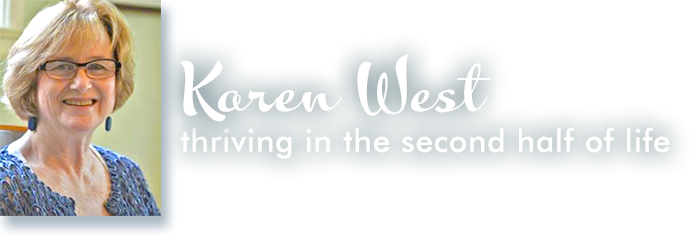In the first blog entry I wrote about legacy, I quoted Andrew Weil in Women’s Lives, Women’s Legacies, by Rachael Freed. Weil wrote that the ethical will [legacy letter] is a “wonderful gift to leave your family at the end of your life,” but “it’s main importance is what it can give you in the midst of your life.” (4) This is especially true of the second legacy letter that I wrote.
 Most of my favorite authors who write about conscious aging are Buddhists. And this is especially true when it comes to the topic of mortality. Buddhists are encouraged to embrace this concept. One of my favorite books about this topic was written by Frank Ostaseski, the first Zen Hospice Director in 1987 in San Francisco. In his book The Five Invitations: Discovering What Death Can Teach Us About Living Fully, Ostaseski wrote, “It is the impermanence of life that gives us perspective. As we come into contact with life’s precarious nature, we also come to appreciate its preciousness. Then we don’t want to waste a minute. We want to enter our lives fully and use them in a responsible way. Death is a good companion on the road to living well and dying without regret.” (3)
Most of my favorite authors who write about conscious aging are Buddhists. And this is especially true when it comes to the topic of mortality. Buddhists are encouraged to embrace this concept. One of my favorite books about this topic was written by Frank Ostaseski, the first Zen Hospice Director in 1987 in San Francisco. In his book The Five Invitations: Discovering What Death Can Teach Us About Living Fully, Ostaseski wrote, “It is the impermanence of life that gives us perspective. As we come into contact with life’s precarious nature, we also come to appreciate its preciousness. Then we don’t want to waste a minute. We want to enter our lives fully and use them in a responsible way. Death is a good companion on the road to living well and dying without regret.” (3)
One of the ways we can prepare for our death is to complete an advance directive, and we shouldn’t put this off. Stephen Levine makes a great analogy in his book A Year to Live: How to Live This Year as If It Were Your Last. He writes, “Because we never know whether our next breath may be our last, being prepared for the immediate unknown becomes as practical as applying for a passport while still uncertain of our destination or time of departure.” (13)
In the past, doctors would make most of the important medical decisions. But now more and more, people are writing advance directives that tell the doctor what kind of treatments they want and don’t want. This advance directive is your “passport.” Unfortunately, though, while most people know they should make an advance directive, many people have not completed one. I think the reason that so few people have not actually completed this document is not because they don’t want to think about dying, but because writing an advance directive is complicated, and they don’t know what to say.
As a part of this process, we need to carefully choose a healthcare proxy to whom we can explain our end-of-life wishes and who will be committed to fighting for those wishes if necessary. And we shouldn’t necessarily choose the first person who comes to mind—maybe it shouldn’t even be a relative. But it isn’t enough to choose someone; we also have to have “the conversation.”
 Rachael Freed, who wrote the book Your Legacy Matters: harvesting the love and lessons of your life, strongly suggests that we write a legacy letter to go with our advance directive, and so does Barbara Coombs, the president of Compassion & Choices. If we write a letter to go with our directive, when the time comes, our loved ones will appreciate having something to refer to that is in our voice. Writing this letter can help us decide what we want to put in our directive. And finally, and perhaps most importantly, this letter will also make it easier for us to know what to talk about when we have “the conversation.” As Barbara Coombs says in Finish Strong: Putting Your Priorities First at Life’s End, “the best preparation is people preparation, not paper preparation.” (44) In my next blog entry, I will write about what you might want to put in your advance directive and what you might like to talk about when you have “the conversation.”
Rachael Freed, who wrote the book Your Legacy Matters: harvesting the love and lessons of your life, strongly suggests that we write a legacy letter to go with our advance directive, and so does Barbara Coombs, the president of Compassion & Choices. If we write a letter to go with our directive, when the time comes, our loved ones will appreciate having something to refer to that is in our voice. Writing this letter can help us decide what we want to put in our directive. And finally, and perhaps most importantly, this letter will also make it easier for us to know what to talk about when we have “the conversation.” As Barbara Coombs says in Finish Strong: Putting Your Priorities First at Life’s End, “the best preparation is people preparation, not paper preparation.” (44) In my next blog entry, I will write about what you might want to put in your advance directive and what you might like to talk about when you have “the conversation.”


4 thoughts on “The Best Preparation is People Preparation”
I think you’re right on about people don’t write advanced directives because it’s complicated and they don’t know what to say.
Thank you for your reply. Have you had the “conversation”?
Thank you, Karen. This is well-written and an awesome reminder of the gifts we can give to our loved ones. Best, Linda.
Thank you for your reply. Have you had the “conversation”?